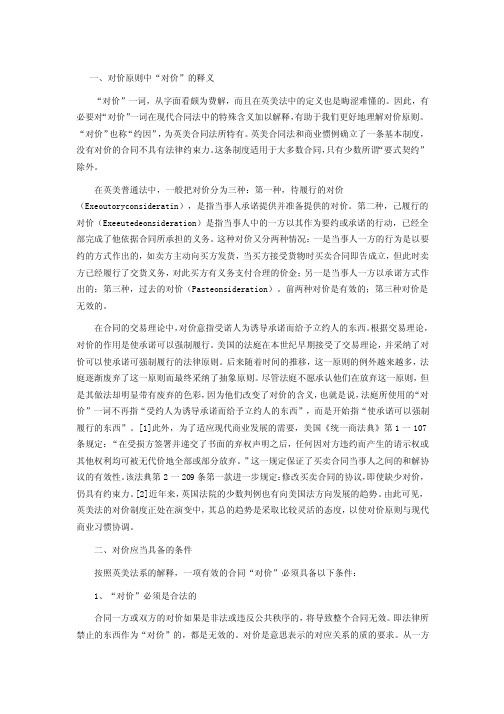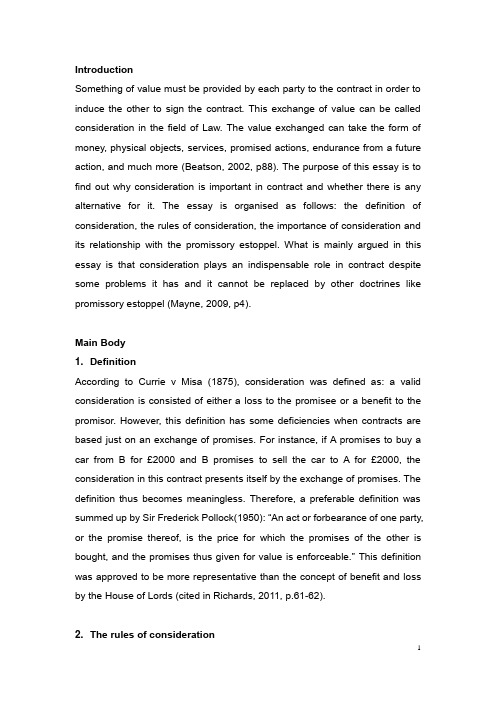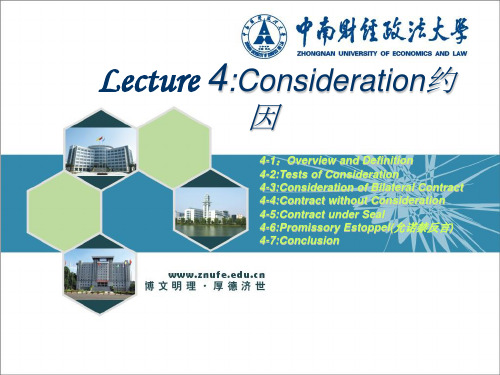合同法法中的Consideration约因或对价
对价原则——精选推荐

一、对价原则中“对价”的释义“对价”一词,从字面看颇为费解,而且在英美法中的定义也是晦涩难懂的。
因此,有必要对“对价”一词在现代合同法中的特殊含义加以解释,有助于我们更好地理解对价原则。
“对价”也称“约因”,为英美合同法所特有。
英美合同法和商业惯例确立了一条基本制度,没有对价的合同不具有法律约束力。
这条制度适用于大多数合同,只有少数所谓“要式契约”除外。
在英美普通法中,一般把对价分为三种:第一种,待履行的对价(Exeoutoryconsideratin),是指当事人承诺提供并准备提供的对价。
第二种,己履行的对价(Exeeutedeonsideration)是指当事人中的一方以其作为要约或承诺的行动,已经全部完成了他依据合同所承担的义务。
这种对价又分两种情况:一是当事人一方的行为是以要约的方式作出的,如卖方主动向买方发货,当买方接受货物时买卖合同即告成立,但此时卖方已经履行了交货义务,对此买方有义务支付合理的价金;另一是当事人一方以承诺方式作出的;第三种,过去的对价(Pasteonsideration)。
前两种对价是有效的;第三种对价是无效的。
在合同的交易理论中,对价意指受诺人为诱导承诺而给予立约人的东西。
根据交易理论,对价的作用是使承诺可以强制履行。
美国的法庭在本世纪早期接受了交易理论,并采纳了对价可以使承诺可强制履行的法律原则。
后来随着时间的推移,这一原则的例外越来越多,法庭逐渐废弃了这一原则而最终采纳了抽象原则。
尽管法庭不愿承认他们在放弃这一原则,但是其做法却明显带有废弃的色彩,因为他们改变了对价的含义,也就是说,法庭所使用的“对价”一词不再指“受约人为诱导承诺而给予立约人的东西”,而是开始指“使承诺可以强制履行的东西”。
[1]此外,为了适应现代商业发展的需要,美国《统一商法典》第1一107条规定:“在受损方签署并递交了书面的弃权声明之后,任何因对方违约而产生的请示权或其他权利均可被无代价地全部或部分放弃。
合同法中的对价和原因

如何理解原因和动机的不同:
在1989年7月12日判决的案件中,最高法院民事庭: 一个巫师向另一个人出售了一些神秘之物,包括占 卜用的水晶球和作法用的桌子,供买方预测未来之 用。后来,买方付了一部分钱,卖方为得到53000 法郎余款提起诉讼。该法院在判决中说,尽管买方 义务的原因是卖方对财产的转移,且该财产已交付, 但该合同的原因决定于当事人的动机,没有这种动 机,买方是不会签订的该协议的。??在该案中, 当事人的动机是得到预知未来的机会,当然该动机 是违法的。
3、传统理论的缺陷:
a 传统理论排斥对当事人主观心理状态的研究,但是在很 多情况下,对主观原因的排除是人为的和不能自圆其说的。 并且原因并非跟个案没有任何关系。 b 在一个单务合同中,一方面向另一方付款,另一方只需受 领。 c 涉及不法原因,以传统理论,当合同涉及到财产装让时, 只有标的物违法(比如是禁止流通物)时,才会导致买方义 务的原因违法。 4、现代理论的观点 现代理论认为:原因不仅指近因,也包括远因,即当时人 的动机。因此现代理论打破了主观主义与客观主义的严格界 限,使原因和动机很少混同了。提出了具体原因论,主张对个 案中的原因进行考察。
2、基于错误原因的合同:当事人错误地相信 其义务的存在,但实际上不存在的情况。
• 在1924年7月1日由最高法院判决的案 件中,一个剧院的所有人许诺赔给一 个音乐家一笔钱,因为后者的乐器在 一场火中被烧毁了。前者错误的相信 ,他有法律上的义务作出赔偿。然而 实际上,他依法律规定无义务赔偿。 判决结果是,这是基于错误原因作出 的许诺,故前者的许诺可以不履行。
Q4:怎么理解法律规定的义务不能作为对价?
• 设若前述甲允诺赠予四年学费的对象不是其友之 子乙, 而是对自己的儿子丙说, “如果你考上北 京大学附中, 我一定负担你的学费。 ” • 则甲为丙支付中学学费的行为不能构成丙辛苦劳 动的对价,因为丙作为未成年人享有受教育权, 其父甲负有保障其子受教育权得以实现的法定义 务。 • 故若丙果真考上北京大学附中, 甲为其支付学费 的行为仅是其履行法定义务的表现, 不能构成对 价。
国际合同法-Consideration约因

违反诚信义务
合同一方违反了诚信义务, 如故意隐瞒重要信息、误 导对方等。
违反合法性要求
合同内容本身不合法或者 违反公共利益,如赌博协 议、贩卖毒品等。
违反约因的救济途径
实际履行
要求违约方按照约定履行 合同义务,如交付货物、 提供服务等。
赔偿损失
要求违约方赔偿因违约造 成的损失,包括直接损失 和间接损失。
备真实性。
约因的合法性
约因的合法性要求合同内容必须符合法 律法规的规定,不能违反公共利益或国
家法律强制性规定。
在国际合同法中,不同国家和地区的法 如果合同内容违反了法律法规或国家利 律法规可能存在差异,因此对于合法性 益,那么该合同的约因就不具备合法性。 的判断需要根据具体的法律环境进行。
约因的合理性
02 约因的类型
约因的类型概述
约因是指合同有效成立的重要因 素,是合同当事人之间合意的真
实基础。
在国际合同法中,约因的类型包 括对价约因、互惠约因、合法约
因等。
不同类型的约因在合同成立和履 行过程中发挥着不同的作用,对
合同的法律效力产生影响。
对价约因
对价约因是指合同当事人之间 相互交换的利益,是合同成立 的重要基础。
THANKS FOR WATCHING
感谢您的观看
约因的合理性要求合同条款必须公平合理,不能显失公平或违反商业惯 例。
在实践中,法院会根据合同的具体情况、双方当事人的地位和经验等因 素来判断约因的合理性。
如果合同条款存在显失公平或违反商业惯例的情况,那么该合同的约因 就不具备合理性。
04 约因的违反与救济
违反约因的情形
01
02
03
未能履行承诺
合同一方未能按照约定履 行自己的承诺,如未交付 货物、未提供服务等。
合同法 Contract Law

Contract law- Introduction
3.1.1 Definition of Contract (p68)
An agreement made between two or more persons, with the intention of creating certain legal rights and duties, which is enforceable at law.
• Clausula rebus sic stantibus does not apply if the parties to a contract had contemplated for the occurrence of the changed circumstance. It only relates to the changed circumstances that were never contemplated by the parties.
• Exceptio Non Adimpleti Contractus: Latin: exception of a non-performed contract
• “Exceptio non adimpleti contractus ... the right to refuse to perform one’s obligations under a reciprocal contract unless or until the other party dos so.
simple contract could be made either expressly
or impliedly, orally or writing form.
对价在合同法中的作用(英文)

IntroductionSomething of value must be provided by each party to the contract in order to induce the other to sign the contract. This exchange of value can be called consideration in the field of Law. The value exchanged can take the form of money, physical objects, services, promised actions, endurance from a future action, and much more(Beatson, 2002, p88). The purpose of this essay is to find out why consideration is important in contract and whether there is any alternative for it. The essay is organised as follows: the definition of consideration, the rules of consideration, the importance of consideration and its relationship with the promissory estoppel. What is mainly argued in this essay is that consideration plays an indispensable role in contract despite some problems it has and it cannot be replaced by other doctrines like promissory estoppel (Mayne, 2009, p4).Main Body1. DefinitionAccording to Currie v Misa (1875), consideration was defined as: a valid consideration is consisted of either a loss to the promisee or a benefit to the promisor. However, this definition has some deficiencies when contracts are based just on an exchange of promises. For instance, if A promises to buy a car from B for £2000 and B promises to sell the car to A for £2000, the consideration in this contract presents itself by the exchange of promises. The definition thus becomes meaningless. Therefore, a preferable definition was summed up by S ir Frederick Pollock(1950): “An act or forbearance of one party, or the promise thereof, is the price for which the promises of the other is bought, and the promises thus g iven for value is enforceable.”This definition was approved to be more representative than the concept of benefit and loss by the House of Lords(cited in Richards, 2011, p.61-62).2. The rules of considerationAlthough the definition of consideration is direct and simple, it is wrong to regard it as a single coherent principle. Actually the doctrine of consideration as we know today is made up of a series of sub-principles and their exceptions (Richards, 2011, p.62). The sub-principles can be divided into three main categories as below (McKendrick, 1998, p.86).(1). Consideration can be executed or executory but it cannot be past(Richards, 2011, p62).(2). “Considerat ion must move from the promisee” (Beatson, 2002, p95).(3). Consideration must be sufficient but it need not be adequate(Lilienthal, 2011).When it comes to exceptions, it can be concluded that if either the promisor or the promisee already had a legal duty to pay such payment, it cannot be seen as consideration in the legal perspective(Lilienthal, 2011).3. Why consideration is important?Consideration is one of the primary constituent parts of an “enforceable contract” in English Law(Richards, 2011, p.60). It has many functions which make it indispensable in contract.Firstly, the doctrine of consideration has many functions. The most important function of consideration is to connect the two promises. This main function is less being talked about because consideration has already been regarded as a precondition of a valid contract(Bucher, no date, p21).Secondly, the reason why consideration is so important is its openness and elasticity. It gives the judge “room for discretion” when being used in specific cases. That is also the reason why consideration must be contained in every valid contract. (Bucher, no date, p22)Finally, consideration is a necessity for the formation of each simple contract. A contract without consideration is not suable. Moreover, It can also be used to make a distinction between “binding promises” and which can be regarded as “gratuitous” (Mayne, 2009, p.1). In each case, it became indispensable to ask whether the promisor receives any interest or the promiseeassumes any loss as long as it is related to contract. If the answer was no, the promise was “gratuitous” rather than “binding”(Beatson, 2002, p.92).4. Relationship between consideration and promissory estoppelIt can be seen from the definition of consideration that consideration is required in most agreements if they want to be enforced by the Court (Lilienthal, 2011). However, in practical situations, there aresome gratuitous gift contracts, which mean the donor promises to give something to the donee for free. If the promisor breaches his promise, there is no legal basis to remedy the detriment of the promisee. It is extremely unfair to promisee who suffers loss due to the reliance to the promisor (Beatson, 2002, p112). However, it can be argued that this problem of consideration has been mitigated through the development of the law in the fields of promissory estoppel (Mayne, 2009, p1).According to Denning J (cited in McKendrick, 2003, p.117), promissory estoppel can be defined as: When a person makes a clear statement of his future conduct whatever by words or behaviour, showing the statement to be reliable and to affect the relationship between the parties, and the other person changes his legal position because of the reliance on the promise, the first person will be prevented from doingwhat is contrary to the premier statement.However, what can be seen from the definition of promissory estoppel is that there are five important elements included, such as the promise to future conduct, the reliance and it must be inequitable for the promisor to breach his promise. Only meets all of these elements can promissory estoppel come intoforce. What’s more, the gratuitous contracts are in the minority of practical cases after all, which means the use of promissory estoppel is still limited and it cannot meet the needs of all contracts (McKendrick, 2003, p117-118). Therefore, in view of this it is possible to draw a conclusion that although promissory estoppel does have solved some problems of consideration, it cannot be an alternative of consideration. It can only be regarded as a supplement of consideration(Mayne, 2009, p4).ConclusionIn conclusion, although the role of consideration is not as significant as it was before in the modern law of contract because of the mitigating effects of modern legal developments in the field of promissory estoppel and other doctrines, considerationis still very important toidentify whether legal relations have been set up(Mayne, 2009, p4).。
中英双语解析合同的主要构成部分

The Main Components of a Contract 合同翻译基础合知望达汇编整理2020.9目录一、合同的结构 (3)二、引言和“鉴于”条款(Preamble & recitals) (5)2.1 合同主体条款Contracting parties (5)2.2 “引言”部分Recitals (6)2.3 有效对价Good and valuable consideration (6)2.4 公平交易Arm's Length terms (7)三、责任与义务(Obligations of the parties)条款 (8)3.1 各方义务(Obligations of the parties)条款 (8)四、价格(Price)条款与支付(Payment terms)条款 (9)4.1 价格条款(Price) (9)4.2支付条件条款(Payment terms) (10)五、合同有效期条款(Terms of contract) (10)5.1 生效Effectiveness (10)5.2 合同期的延长Extension of availability (11)5.3 合同中止/暂停Suspension of contract (11)5.4 合同终止Termination of contract (12)六、损害赔偿条款(Indemnification) (13)七、陈述与保证条款(Representations and warranties) (14)八、保险要求INSURANCE REQUIREMENTS (15)九、不可抗力条款Force Majeure (16)十、合同争议解决(Disputes)条款 (18)十一、司法管辖Jurisdiction (23)十二、证明WITNESS与签署Signatures (24)12.1证明WITNESS (24)12.2 签署Signatures (25)十三、附件附录Schedule, Exhibit, Annex, Appendix, Attachment (25)13.1 附件Schedule (25)13.2 附件Exhibit (26)13.3 附录Appendix (27)13.4 附件/附录Annex (27)13.5 附件attachment (28)一、合同的结构1. 必备条款essential clauses / provisions2. 一般条款/通用条款general provisions3. 特殊条款/专用条款special provisions4. 章.条.款.项.目5. 首部non-operative part (当事人部分parties 陈述部分recital)经营地址,存续情况等6. 正文operative part7. 陈述部分recitals (包括:鉴于条款whereas clause和约因consideration)8. 尾部closing part (证明部分attestation 签字signature 附件appendix)9. 合同主体的名称.姓名和住所name and domicile of the parties10. 适格主体competent parties11. 标的contract object , subject matter12. 数量quantity 质量quality13. 价款或者报酬price or remuneration14. 对价consideration15. 履行时效.地点和方式time limit, place and method ofperformance16. 违约责任default / liability for breach of contract17. 除外规定exception18. 解决争议的方法methods to settle disputes19. 变更modification 终止termination 撤销cancellation 解除rescission20. 主体的变更或权利义务的整体转让novation21. 通知notice22. 违约责任default / breach of contract23. 救济remedies24. 责任的免除exception25. 不可抗力force majeure26. 争议的解决settlement of disputes27. 合同的生效effectiveness / validity28. 合同份数counterpart29. 合同的整体性entirety 合同的可分割性severability 合同的完整性entirety30. 文字效力language31. 法律适用applicable law / governing law32. 保密规定confidentiality33. 副本copies / counterparts34. 性别与单复数gender and singular / plural35. 合同尾部closing clauses / final clause(包括:证明条款attestation 签字部分testimonium / signature 附件部分addendum)二、引言和“鉴于”条款(Preamble & recitals)英语合同,在主体条款之后,往往会有一段“引言”。
国际合同法-Consideration 约因

3-1约因(Consideration)概说 约因( 约因 )
3-2.约因之意义 3-3.约因之功能
3-4 约因之判断
3-4-1.约因须经当事人双方交易磋商者 3-4-1-1.赠与性允诺(Gift Promise) 3-4-1-2.兼具交易磋商及赠与性质之约定允诺 (Mixture of Bargain and Gift Promise) 3-4-1-3.表面上或名义上之约因(Sham and Nominal Consideration) 3-4-1-4.以已发生事务为交易之允诺
3-4-2约因须系受约人因约定人之许诺而为承 诺或行为者 3-4-2-1.约因之适当性(Adequancy)问题 3-4-2-2.承诺或履行“既存义务”(Preexisting Duty)之问题 3-4-2-3.权利之不行使作为契约约因 (Forbearance as Co契约之约因 双方契约之约因
3-5-1.总说 3-5-2.约因之争
3-5-3义务之相互性(Mutuality of 义务之相互性( 义务之相互性 Obligation)或称约因之相互性 ) (Mutuality of Consideration) )
3-5-3-1. 3-5-3-1.定义 3-5-3-2.单方契约与义务之相互性原则 3-5-3-3.得撤销或不得强制履行之约定与相互性原则 3-5-3-4.虚幻允诺(Illusory Promise)与相互性原则 3-5-3-5.默示允诺(Implied Promise)与相互性原则 3-5-3-6.无效契约(Void Contract)与相互性原则
Lecture 4:Consideration约
因
4-1:Overview and Definition 4-2:Tests of Consideration 4-3:Consideration of Bilateral Contract 4-4:Contract without Consideration 4-5:Contract under Seal 4-6:Promissory Estoppel(允诺禁反言) 4-7:Conclusion
对价与约因

对价与约因Document serial number【UU89WT-UU98YT-UU8CB-UUUT-UUT108】对价(consideration)与约因(cause)合同成立的诱因;致使缔约方缔结合同的原因、动机、代价或强迫性的影响力;一方当事人获得的权利、利益、利润或好处,或另一方当事人所遭受的损失或承担的义务。
这是有效合同存在并对当事人有法律约束力的基本且必须的要素:对价是英美合同法的重要概念。
其引入是基于以下的原因:按照传统的观点,合同是一项或一组这样的允诺〔promise):它或它们一旦被违反,法律就会给予救济。
而要使允诺成为一项法律能为之提供救济的允诺,即成为有法律约束力的合同,则受允诺人(promisee〕必须向允诺人〔promisor〕提供某种与该诺言相对应的回报,这种回报就被认为是对价。
关于对价,有两种理论具有重要影响力:其一是19世纪初产生的「获益-受损公式」〔benefit-detriment〕,即如果允诺人从交易中获益,那么这种获益就是其作出允诺的充分对价;而另一方面,如果受诺人遭受了某种损害,那么这种损害也足以证明对方曾经作出过某种允诺。
其二是19世纪末产生的「对价的变换理论」〔bargain theory of consideration),即:对价的本质在于它是作为允诺的动机或诱因而提出和接受的;反言之,允诺之做出亦是对价之给付的诱因。
整件事的根本就在于对价与允诺之间的互惠引诱关系。
该理论由于与商品经济的飞速发展极为适应,因此很快成为美国法中对价制度的新正统。
根据《美国(第二次)合同法重述》〔Restatement (Second) of Contracts〕,对价之意义,系指合乎法律规定之交换要素,其重心在于:1.受允诺人承诺或履行了其在法律上原无义务的作为或不作为,即受允诺人受有损害〔detriment;2.允诺人以其允诺交换磋商(bargain for)受诺人之作为或不作为。
- 1、下载文档前请自行甄别文档内容的完整性,平台不提供额外的编辑、内容补充、找答案等附加服务。
- 2、"仅部分预览"的文档,不可在线预览部分如存在完整性等问题,可反馈申请退款(可完整预览的文档不适用该条件!)。
- 3、如文档侵犯您的权益,请联系客服反馈,我们会尽快为您处理(人工客服工作时间:9:00-18:30)。
Case:史蒂克尔诉迈立克案
在1809年史蒂克尔诉迈立克案中,被告(船长)因两个海 员潜逃而向其余海员许诺:如果他们把船开回国去, 将额外分享那两个海员的工资,但后来被告与海员之 间发生纠纷。法庭裁定,由于海员们本应负有将船驶 回国的合同义务,因而被告的许诺并没有对价,故不 具有合同效力。
但也存在例外。
consideration must be sufficient but it need not be adequate.
It means that as long as the promisee’s act or promise satisfies the legal value test, the courts do not ask whether that act or promise was worth what the promisor gave, or promised to give, in return for it.
Moral obligation
Case: White v. Bluett A son promised not to bore his father with complaints
about the father’s distribution of his property among his children was held not to be good consideration for the father’s promise not to sue the son. The opposite case: Hamer v. Sidway: an uncle promised to pay his nephew 5000 if the nephew refrained from drinking liquor, using tobacco, swearing and playing cards untl he was 21. This promise was held to be enforceable because the nephew had a legal right to engage in such activities, and in giving up his rights he had provided consideration for the promise.
2) The orthodox传统的 position is clear: performance of an existing duty imposed by law does not constitute consideration.
3) case: Warபைடு நூலகம் v. Byham.
Preexisting Contractual Duties
Williams v. Roffey Bros &Nicholls Ltd
The defendant contractors entered into a contract to refurbish a block of flats. They sub-contracted the carpentry work to the claimant for price of 2000 pound. The claimant ran into financial difficulties after having completed part of the work. The cause of his difficulties was partly attributable to the fact that he had underpriced the job and partly because of his own inability to supervise his workforce. It was in the interest of the defendants to ensure that the claimant completed the work on time because if, as a result of delay or non-performance by the claimant, the defendants were late in completing the work and they would incur liability to their employers. So the defendants agreed to pay an extra 10300 to ensure that the work was completed on time. The claimant subsequently finished eight more flats but defendant only paid 1500. The claimant sued to the court.
Until recently the rule which English law adopted was that performance of an existing contractual duty owed to a promisor was no consideration for fresh promise given by that promisor.
约因要有价值,一般最常见的是金钱。但也可以是其 他的形式,如权益的放弃,提供服务或消息,修改原 先合约,以后的生意,及可以想象到的“好处”。
Adequacy of Consideration
General Rule: The first rule of the doctrine教条 of consideration is that
Preexisting Legal Duties
1) The question whether performance of a duty which one is already under an obligation to perform can constitute consideration for a promise given in return is currently a very controversial one in English contract law.
What’s consideration
法律上认可的对价(约因)的定义:“ 对受诺人有 损失,或对承诺人有利益 ”[A valuable consideration, in the sense of he law, may consist either in some right, interest, profit or benefit accruing to the one party, or some forbearance, detriment, loss or responsibility given, suffered or undertaken by the other.]
Unit 3 Consideration (约因或对价 )
约因是英美法中一个重要而且复杂的概念。对确定 一个合约是否有效,包括商贸活动中常有的事后更改 合约(variation),追加协议(additional agreement), 和解 协议等是否有效,非常重要。
英国法律认为约因是“订约双方愿意去受法律约束 的唯一证据” ( only evidence of the intention of the parties to be bound )
